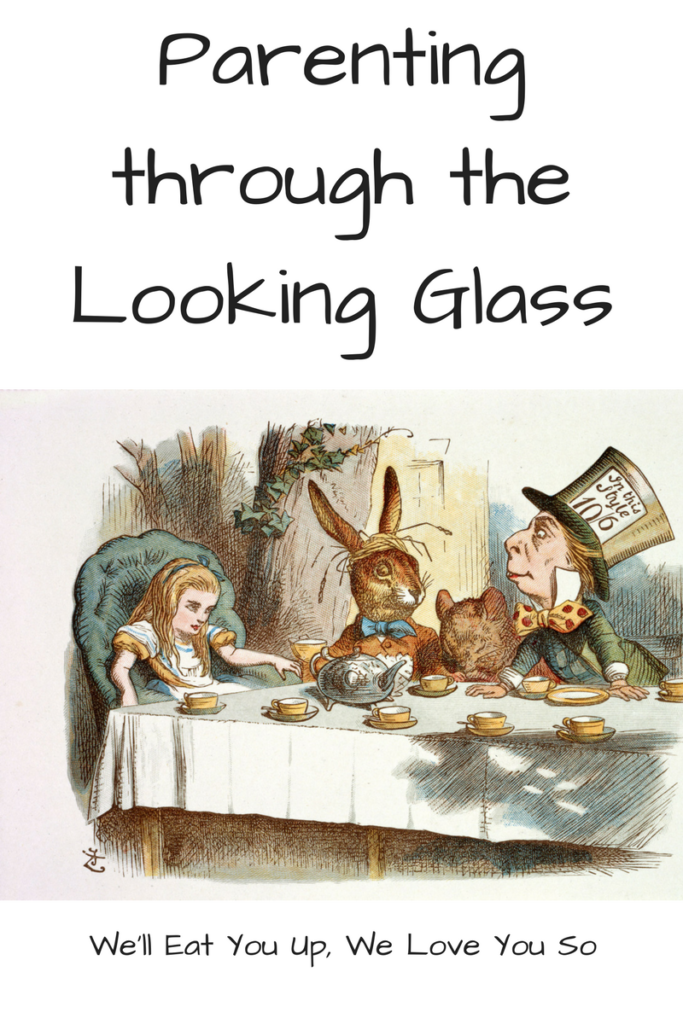
The fairy-like White Queen gazed at me intently. Lying on a table, her look invited me into Wonderland, a place of childhood on the edge of adulthood. Then she shoved herself backwards, flew across the table, and jumped to her feet, towering over us.
This was all quite literal.
Last weekend, Chris and I took our first trip by ourselves since Sprout was born. The trip was nominally celebrating our eleventh wedding anniversary. So we were in New York City, watching a play put on in a former mental institution. The play – based on Alice’s Adventures in Wonderland, Through the Looking Glass, and the real-life relationship between Lewis Carroll and Alice Liddell – sparked insight for me about childhood, parenting, and how both are more complex than they seem.
The play was Then She Fell, an immersive, surreal, beautiful adaptation. Rather than a traditional play with actors on a stage and the audience in seats, the audience is intimately part of the performance. Right after the introduction, the actors led groups to separate rooms to watch scenes of characters interacting with each other and us. They quickly split us up again and again until you were one-on-one with some of the characters.
Like the books, the play explores the liminal, transformative space between childhood and adulthood. It wrestles with the back-and-forth, push and pull of the two. The White Queen represents the chaotic, magical, wild place of childhood; the Red Queen the buttoned-up, controlled, proper world of adulthood. In the play, they’re warring. Alice and the audience are continually torn between the two.
And yet, as a parent, I know in my heart that the child/adult split isn’t so simple. Childhood is never as easy as adults remember it. It’s hard, confusing and frequently overwhelming. That’s why children’s Big Emotions can be so devastating. While adults think of childhood as a time of ultimate freedom and no responsibilities, children never do. In fact, they often long for adulthood. To them, adulthood is a time you finally understand things and have control over your life.
On the flip side, becoming an adult doesn’t mean abandoning adventure and imagination for cruel reality. Wonder and responsibility can co-exist. Stories are not a distraction from adulthood – they’re what get us through the most difficult of times, child and adult alike. The ordinary world and Wonderland can and do overlap, just as long as we give each the right space.
But these two worlds can’t illuminate each other unless we see the relationship between us and our children as two-way. We teach them, but they also teach us.
Just as Alice stepped through the Looking Glass, parents and children are both windows and mirrors for each other. We parents offer children a window into our world, seeing bits and pieces of the realities and responsibilities of being an adult. My experiences may seem terribly foreign to my children now, but I hope that I provide enough context for them to make sense of it themselves. I answer Sprout’s questions straightforwardly and honestly, from pregnancy to death. I try to be open with him about my failures, whether they’re getting rejected by an editor or losing his hat. He doesn’t always make it easy – he bought up the hat incident the other day even though it happened months ago!
Meanwhile, he provides me with glimpses into his world. Every time he stops to pick a dandelion, treats his stuffed bunny as real, or sets up an imaginary ice cream shop, he’s opening up that window. When I tell a Hop and Bun story, order pizza from our play kitchen, or listen to the intricacies of his toy trains, I can enter that world for just a little while. I can’t stay there, but in the long run, none of us can.
At the same time, we act as mirrors for each other. What we see in our children is often a reflection of us.
Sometimes it’s good, like when we see our values embodied in them. I see it in Sprout when he hugs his brother or shares toys with random strangers in the park. Ilana Wiles, who writes the blog Mommy Shorts, has a great story about how her older daughter told her younger one, “There is no GIRL STUFF and BOY STUFF.”
And we see ourselves mirrored in not-so-flattering ways too. When Little Bird put his hands on his hips when he was angry the other day, I realized that maybe he saw it someone in our household do it too often. (Yep, it’s me.)
As they grow older, they’ll see themselves in me as well. From reactions to favorite songs to our deepest anxieties, we look to our parents to understand ourselves.
As parents of young children, we’re constantly in that liminal space, that in-between world lying between childhood and adulthood. We try to guide our children into the adult world while they teach us to re-experience childhood through new eyes. Rather than trying to wrest control to one side or another, we can embrace both.
It took a weekend away from my children and falling down the rabbit hole to remind me how much we have to teach each other.
For more on our adventures in parenting, be sure to follow our Facebook page!